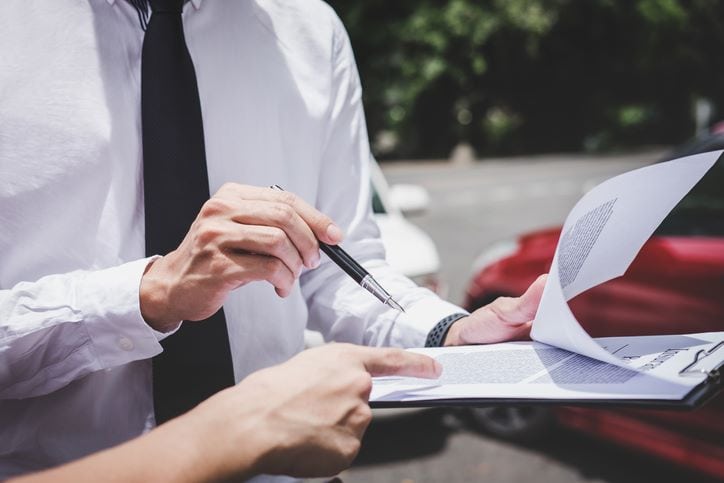
Car accidents are an unfortunate reality of modern life, and they can lead to significant financial and personal hardships. In Nevada, as in many other states, having car insurance is a legal requirement. However, not everyone abides by this law, leaving many individuals wondering about their options if they’re involved in an auto accident with an uninsured driver. Can you sue someone who doesn’t have car insurance? What steps should you take if you find yourself in this situation? In this comprehensive guide, we’ll explore your rights, options, and potential outcomes.
Understanding Your Rights:
In Nevada, drivers must carry minimum liability insurance to cover damages from accidents they cause. However, some still drive uninsured. If you’re in an accident with an uninsured driver, you can seek compensation through legal action. While suing an uninsured driver is challenging, it’s possible. Success depends on factors like the uninsured party’s assets and ability to pay.
Assessing the Situation: What Happens After an Accident with an Uninsured Driver?
If you’re involved in an accident with an uninsured driver, the immediate aftermath can be stressful and confusing. Here’s what you should do:
Assess Injuries: Check yourself and others involved in the accident for injuries. If anyone requires medical attention, call emergency services immediately.
Document the Scene: Take photographs of the accident scene, including vehicle damage, road conditions, and any visible injuries.
Exchange Information: Obtain the uninsured driver’s contact details, license plate number, and any other relevant information.
Notify Authorities: Report the accident to the police and ensure that an official report is filed. This documentation will be valuable when pursuing legal action.
Notify Your Insurance Company: Inform your insurance provider about the accident and inquire about your uninsured/underinsured motorist coverage.
Options After a Car Accident with an Uninsured Driver
If you’re involved in a car accident with someone who doesn’t have car insurance, it can create significant challenges, particularly when it comes to seeking compensation for your damages. However, there are several options available to you:
Uninsured Motorist Coverage (UM): Utilize your own insurance policy’s UM coverage to seek compensation for your damages.
Underinsured Motorist Coverage (UIM): If the at-fault driver’s insurance is insufficient, your UIM coverage can help cover the gap.
Personal Injury Lawsuit: File a lawsuit against the uninsured driver to recover damages for medical expenses, lost income, and other losses.
Government Assistance Programs: Investigate government programs that may provide financial aid for accident victims.
Uninsured Motorist (UM) Coverage:
Uninsured motorist coverage is designed to protect you if you’re involved in an accident with an at fault driver who doesn’t have auto insurance. In such cases, if you sustain injuries or property damage, your UM coverage kicks in to provide compensation for your losses. UM coverage typically includes:
Bodily Injury Coverage: This aspect of UM coverage helps pay for medical expenses, lost wages, and pain and suffering resulting from injuries sustained in an accident with an uninsured driver.
Property Damage Coverage: UM coverage may also extend to cover damage to your vehicle or other property caused by an uninsured driver.
Underinsured Motorist (UIM) Coverage:
Underinsured motorist coverage comes into play when the at-fault driver’s insurance coverage is insufficient to cover your total damages. In such situations, your UIM coverage fills the gap between the at-fault driver’s liability limits and the actual cost of your damages. UIM coverage typically includes similar benefits to UM liability coverage, providing compensation for medical expenses, lost wages, and other losses.
How to File an Uninsured Motorist Claim?
Filing an uninsured motorist claim involves several steps, which may vary depending on your insurance provider and the specific circumstances of the accident. Here’s a general overview of the process:
Report the Accident: Notify your insurance company as soon as possible after the accident. Provide details about the incident, including the date, time, and location, as well as any injuries or property damage sustained.
Gather Documentation: Collect all relevant documentation to support your claim, including the police report, medical records, photographs of the accident scene and damages, and any witness statements.
Complete Claim Forms: Your insurance company will likely require you to fill out specific claim forms detailing the nature and extent of your damages. Be thorough and accurate in providing this information.
Cooperate with Investigations: Your insurance company may conduct its investigation into the accident to verify the details of your claim. Cooperate fully with any inquiries or requests for additional information.
Negotiate a Settlement: Once your own insurance company has reviewed your claim, they will typically offer a settlement amount based on their assessment of your damages. You have the right to negotiate with the insurance company to ensure that you receive fair compensation for your losses.
When to File a Personal Injury Lawsuit Against an Uninsured Driver
Filing a personal injury lawsuit against an uninsured driver is typically considered when other avenues for compensation, such as uninsured motorist coverage or negotiations, are insufficient or unavailable. Here are some situations when it may be appropriate to pursue a lawsuit:
Significant Damages: File a lawsuit if your damages are substantial and other avenues for compensation are insufficient.
Permanent or Long-Term Injuries: Consider a lawsuit if your injuries are permanent or long-term, leading to ongoing expenses.
Disputed Liability: Pursue legal action if there’s disagreement over who is at fault for the accident.
Refusal to Cooperate: If the uninsured driver is uncooperative or unwilling to negotiate, a lawsuit may be necessary.
Uninsured Driver’s Assets: If the uninsured driver has assets that can cover your damages, filing a lawsuit may be worthwhile.
Statute of Limitations: Be mindful of the time limit for filing a lawsuit, as waiting too long may forfeit your right to seek compensation.
Can You Sue Someone Who Doesn’t Have Car Insurance?
Yes, you can sue someone who doesn’t have car insurance. However, winning a lawsuit against an uninsured driver doesn’t guarantee that you’ll receive the compensation you’re entitled to. Even if a court orders the uninsured driver to pay damages, if they lack the financial means to do so, recovering your losses may prove difficult.
How to Sue an Uninsured Driver?
Suing an uninsured driver involves several steps and legal considerations. Here’s a general guide on how to proceed with a lawsuit against an uninsured driver:
Assess Damages: Evaluate the extent of your losses from the accident, including medical bills and property damage.
Check Insurance Coverage: Review your own policy for uninsured or underinsured motorist coverage.
Consult Legal Expertise: Seek guidance from a personal injury attorney experienced in car accident cases.
Collect Evidence: Gather pertinent documentation such as accident reports and medical records to support your claim.
File Lawsuit: Initiate legal action against the uninsured driver by filing a personal injury lawsuit.
Serve Defendant: Ensure proper delivery of legal documents to the other driver as per court requirements.
Conduct Discovery: Engage in the evidence-gathering process, including interrogatories and depositions.
Proceed to Trial: If necessary, present your case in court before a judge or jury.
Is It Worth Suing an Uninsured Driver?
Determining whether it’s worth suing an uninsured or underinsured driver depends on various factors, including the extent of your injuries, the available evidence, and the uninsured driver’s financial situation. Before pursuing legal action, weigh the potential costs and benefits, and consider alternative means of seeking compensation, such as through your own insurance policy.
What if I Sued But the Uninsured Driver Won’t Pay?
If you’ve successfully sued an uninsured driver but they refuse or are unable to pay the judgment, you may need to explore other avenues for enforcing the judgment. This could involve measures such as garnishing wages, placing liens on property, or seeking assistance from a collections agency. Additionally, consulting with your attorney to assess the feasibility of these options and taking appropriate legal steps to enforce the judgment is advisable.
Why You Need an Attorney After a Car Accident with an Uninsured Driver
In the unfortunate event that you’re involved in a car accident with an uninsured driver, seeking the assistance of an experienced attorney can be invaluable. Here’s how a knowledgeable car accident lawyer can help you navigate the complexities of the legal process and maximize your chances of obtaining compensation:
Legal Guidance: Attorneys provide clear explanations of your legal rights and options after a car accident involving an uninsured driver.
Complex Procedures: They navigate intricate legal procedures, ensuring all necessary steps are taken and deadlines are met.
Evidence Gathering: Attorneys collect crucial evidence like witness statements and medical records to build a strong case.
Negotiation Skills: They negotiate with insurance companies to advocate for fair compensation on your behalf.
Insurance Coverage: Attorneys review your insurance policy to determine available coverage and benefits.
Maximizing Compensation: Attorneys assess all damages and work to maximize your compensation, including medical expenses and lost wages.
Litigation Representation: If negotiations fail, attorneys can represent you in court and advocate for your rights.
Enforcement of Judgments: Attorneys help enforce judgments against uninsured drivers through various legal avenues.

Discover Your Path to Justice with BLG
Being involved in a car accident with an uninsured driver can be a frustrating and challenging experience. However, it’s important to remember that you do have options for seeking compensation for your losses. By understanding your rights, exploring alternative avenues for recovery, and leveraging resources such as uninsured motorist coverage, you can navigate the aftermath of a collision with greater confidence and peace of mind.
If you’ve been in an accident with an uninsured driver, don’t wait to explore your legal options. At BLG, we’re dedicated to helping accident victims like you seek the compensation you deserve. Our experienced team of attorneys understands the complexities of uninsured motorist claims and will work tirelessly to protect your rights.
Schedule your free consultation today.





